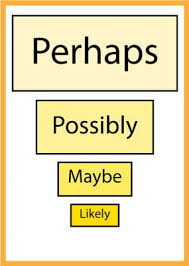perhaps
英 [pəˈhæps]
美 [pɚˈhæps]
- adv. 或许;(表示不确定)也许;(用于粗略的估计)或许;(表示勉强同意或其实不赞成)也许;可能
- n. 假定;猜想;未定之事
使用频率:

记忆方法
为了记住单词“perhaps”,可以创造一个简短的句子或短语,比如“佩奇”(Peke),将“Pe”(代表“perhaps”)和“ke”(谐音“可”)结合起来,形象地记住“也许”、“可能”的意思。
以上内容由AI生成, 仅供参考和借鉴
中文词源
perhaps 也许,可能
来自拉丁语per,凭借,依靠,hap,机会,运气,词源同happy,happen.
英语词源
- perhaps
-
perhaps: [16] The phrase by hap or by haps ‘by chance’ originated in the 14th century (hap ‘chance’, a borrowing from Old Norse, now survives in the derived happen). In the 16th century it was transformed into perhaps on the model of perchance [14] and the now obsolete percase [14], both borrowings from Anglo- Norman containing per ‘by’.
=> happen, happy - perhaps (adv.)
- 1520s, formed from Middle English per, par "by, through" (see per-) + plural of hap "chance" (see happen), on model of peradventure, perchance, etc. which now have been superseded by this word. Perhappons "possibly, by chance" is recorded from late 15c.
权威例句
- 1. The horrors he experienced are imprinted, perhaps indelibly, in his brain.
- 他经历的恐怖事件在他脑海中刻下了深深的,或许是难以磨灭的印记。
- 2. He was not perhaps physically the strongest in the class.
- 他可能不是全班身体最壮的。
- 3. Perhaps he'd followed her suggestion of a stroll to the river.
- 也许他已经听从了她的建议去河边散步了。
- 4. Perhaps you would like to pay a visit to London.
- 也许,您乐意去游览一下伦敦。
- 5. Andy's face paled with disappointment; perhaps with anger as well.
- 安迪的脸色由于失望而变得苍白,也许还掺杂着气愤。
